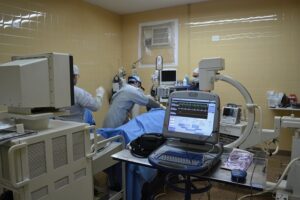ARDS and NICU Care: What Families Should Know
ARDS and NICU Care: What Families Should Know
Acute Respiratory Distress Syndrome (ARDS) is a serious condition that affects the lungs, resulting in severe respiratory failure. It often presents a challenging scenario for both patients and their families, particularly when it occurs in vulnerable populations such as newborns in the Neonatal Intensive Care Unit (NICU). Understanding ARDS—its causes, treatment options, and implications—can empower families and support them during a difficult time. This article will delve into the aspects of ARDS, its relation to NICU care, and provide crucial information that families should grasp for better decision-making and emotional fortitude.
What is ARDS?
ARDS is characterized by widespread inflammation in the lungs, leading to a loss of the normal gas-exchanging function. It can occur for various reasons, including infections, trauma, inhalation of harmful substances, and pneumonia. In the context of neonates, factors such as prematurity, meconium aspiration, or congenital abnormalities may trigger ARDS.
In ARDS, the alveoli—the tiny air sacs in the lungs—are filled with fluid instead of air. This fluid accumulation interferes with the body’s ability to oxygenate blood and remove carbon dioxide effectively, leading to a critical state that necessitates immediate medical intervention.
- Widespread inflammation occurs in the lung tissue.
- Fluid leaks into the alveoli, allowing impaired gas exchange.
- Symptoms can include severe shortness of breath, an increase in respiratory rate, and hypoxemia (low blood oxygen).
Understanding ARDS in Neonates
When ARDS occurs in neonates, it can be particularly distressing for families who may not fully understand the complexities involved. Neonates are at higher risk due to their underdeveloped lungs, and ARDS can escalate rapidly. Key factors that contribute to neonatal ARDS include:
- Prematurity: Babies born before 34 weeks are at increased risk due to underdeveloped lungs.
- Meconium Aspiration Syndrome: When a baby inhales a mixture of meconium and amniotic fluid into the lungs during labor.
- Infection: Pneumonia or sepsis can lead to lung inflammation and ARDS.
Understanding these factors can provide families with context as they navigate the complexities of ARDS in neonatal care. Being informed can help alleviate some fears associated with the unknown.
Signs and Symptoms of ARDS in Newborns
Identifying ARDS early can drastically improve outcomes. Some common signs and symptoms to observe include:
- Rapid Breathing: Increased respiratory rate (tachypnea) is often one of the first signs.
- Grunting: A grunting sound during breathing can show that the baby is struggling to expel air.
- Call for Assistance: If the respiring infant exhibits retractions (pulling in of skin around the ribs) or unusual behavior, it’s essential to alert medical staff immediately.
Early detection and timely intervention are crucial in managing this severe condition. Therefore, understanding these symptoms lays a foundation for better monitoring and care.
The Role of the NICU in Managing ARDS
The NICU is equipped with advanced technology and specialized healthcare professionals who are trained to handle critical illness in newborns. In cases of ARDS, the NICU offers a controlled environment where various interventions can take place to stabilize the infant’s breathing and overall health. The key responsibilities of the NICU staff include:
- Ventilation support: Providing interventions such as Continuous Positive Airway Pressure (CPAP) or mechanical ventilation to assist with breathing.
- Monitoring: Continuous monitoring of oxygen levels, heart rate, and respiratory status to gauge response to treatment.
- Nutritional support: Offering adequate nutrition to support healing, often through intravenous feeds or tube feeding.
NICU staff frequently employ multiple strategies tailored to the individual needs of the baby while focusing on promoting lung development and minimizing complications.
Treatment Options for ARDS
While there is no one-size-fits-all treatment for ARDS, various interventions can stabilize a neonate’s condition. Treatment may encompass:
- Mechanical Ventilation: Provides necessary respiratory support when the infant cannot breathe adequately on their own.
- Sedation: May be utilized to keep the patient comfortable and limit stress on the body during treatment.
- Fluid Management: Careful management of fluids is vital to avoid fluid overload that can exacerbate lung issues.
Additionally, advanced techniques such as Extracorporeal Membrane Oxygenation (ECMO) might be considered in severe cases. This technique pumps blood outside the body to allow for oxygenation while bypassing the lungs, which can be life-saving in extreme circumstances.
Challenges of NICU Care
Navigating the NICU environment poses challenges not only for patients but also for families. The experience can be overwhelming, with constant updates from medical staff, complex treatments, and emotional turbulence. These factors can lead to varying emotional reactions among family members. Some common challenges include:
- Information Overload: Families may receive a lot of technical information that can be difficult to process.
- Parental Guilt: Parents may feel a sense of guilt for their child’s condition or for needing reassurance from staff.
- Managing Stress: The emotional toll can be substantial for families, leading to anxiety and stress.
It’s essential for families to recognize these challenges as a normal part of the experience and seek support from available resources, whether that means relying on hospital social workers, chaplains, or support groups.
Family Involvement in NICU Care
Being integral to the care your child receives in the NICU is critical for families. Engaging with healthcare providers and participating in the infant’s care plan may help mitigate some feelings of helplessness. Here are ways families can be involved:
- Ask Questions: Never hesitate to ask questions about your baby’s condition and treatment. The more you know, the more empowered you feel.
- Visit Frequently: Spending time with your baby can foster a sense of connection and provide emotional support.
- Document Everything: Keeping a journal of your baby’s progress can help you keep track of information provided during consultations.
Being active participants in daily care routines can also offer comfort and demonstrate love and support to the infant.
Emotional and Psychological Support for Families
Watching a child battle a severe condition such as ARDS can take a considerable emotional toll on families. Celebrating small victories or managing setbacks can both elicit a wide range of emotions. As a family, it’s crucial to seek out emotional support networks:
- Therapy and Counseling: Engaging with a mental health professional can provide coping tools.
- Peer Support Groups: Connecting with other families who have faced similar challenges can reduce feelings of isolation.
- Coping Techniques: Mindfulness, breathing exercises, and restorative practices such as yoga may help to manage anxiety and stress.
By recognizing emotional needs and taking proactive steps, families can equip themselves with tools to navigate this challenging journey.
Frequently Asked Questions About ARDS and NICU Care
Understanding ARDS and its treatment can raise many questions for families. Below are some frequently asked questions:
1. What is the prognosis for infants with ARDS?
The prognosis largely depends on the severity of the ARDS and the underlying causes. Many infants can recover with appropriate medical care, but the journey can be lengthy and requires careful monitoring.
2. How can families prepare for NICU discharge?
Before discharge, families will receive education on ongoing care, feeding, monitoring for signs of distress, and follow-up appointments. Understanding how to recognize changes in the baby’s condition is essential.
3. What should families expect during the treatment process?
Treatment in the NICU can involve multiple testing, monitoring changes, and adjusting care protocols as necessary. It’s vital to remain engaged and inquire about your child’s progress.
4. Are there support resources available for NICU families?
Many hospitals have social workers, chaplains, and support groups specifically for NICU families. Online resources are also abundant—organizations like Hand to Hold offer guidance and community for families navigating the NICU experience.
Conclusion
Understanding ARDS and its implications in the NICU can provide families with a sense of empowerment and clarity during a distressing time. While the experience may seem daunting, knowledge can alleviate some fears and foster a collaborative relationship with the care team. Families should feel encouraged to ask questions, participate in their baby’s care, and seek emotional support when needed. By doing so, they can foster hope and resilience as they navigate the challenges ahead.
As you journey through the NICU experience, remember that you are not alone. Countless families have walked this path and have emerged stronger, equipped with newfound compassion and understanding. Seek help, ask questions, and trust in the commitment of healthcare providers to support you and your baby every step of the way.
References
About ARDS and Post-ARDS
ARDS (Acute Respiratory Distress Syndrome) is a life-threatening condition typically treated in an Intensive Care Unit (ICU). While ARDS itself is addressed during the ICU stay, recovery doesn’t end with discharge; patients then embark on a journey of healing from the effects of having had ARDS.
Disclaimer
The information provided in ARDS Alliance articles is for general informational and educational purposes only and is not a substitute for professional medical advice, diagnosis, or treatment. While we strive to present accurate, current information, the field of Acute Respiratory Distress Syndrome (ARDS) and related healthcare practices evolve rapidly, and ARDS Alliance makes no guarantee regarding the completeness, reliability, or suitability of the content.
Always seek the advice of qualified healthcare professionals with any questions you may have regarding a medical condition. Never disregard professional medical advice or delay seeking it because of information you read in ARDS Alliance articles. ARDS Alliance, its authors, contributors, and partners are not liable for any decision made or action taken based on the information provided in these articles.
About ARDS Alliance
Our mission is to improve the quality of life for ALL those affected by ARDS.
The ARDS Alliance is a non-profit committed to raising awareness and enhancing the understanding of Acute Respiratory Distress Syndrome (ARDS), a severe lung condition often occurring in critically ill patients. Through developing alliances, it unites various organizations and experts striving to improve care and support research aimed at finding more effective treatments. Their efforts include educating the public and healthcare providers about ARDS symptoms, risk factors, and advancements in treatment, ensuring better patient outcomes and resource availability.

“As the President of ARDS Alliance, I am dedicated to improving awareness and support for patients suffering from acute respiratory distress syndrome. Our organization works tirelessly to provide resources and education to both patients and healthcare professionals. By fostering a community of understanding and advocacy, we strive to make a positive impact on those affected by this devastating condition.”
~ Paula Blonski
President, ARDS Alliance





